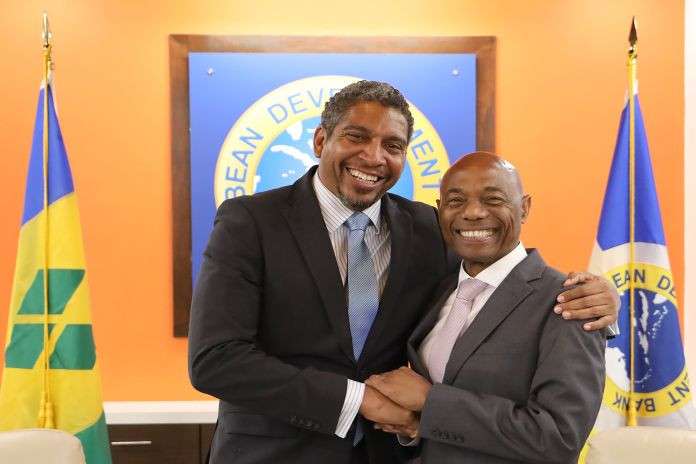BRIDGETOWN, Barbados – “Climate Change is the defining developmental challenge of the Caribbean for our era … we have an environmental catastrophe that is not of our making but which we realise is not a global priority; to save us, we’re going have to do some of this on our own … conceptualising and implementing solutions,” says the Caribbean Development Bank’s (CDB) governor and finance minister of Saint Vincent and the Grenadines, Camillo Gonsalves.
Speaking during a recent visit to CDB’s headquarters in St Michael, Barbados, minister Gonsalves challenged the Bank to generate new tools to bolster advocacy efforts to increase sources of finance available for the region’s growing climate change adaptation and mitigation needs.
Citing the most recent report of the Intergovernmental Panel on Climate Change, he indicated that while Small Island Developing States and low-lying coastal areas can cope with a 1.5 degree change in global temperature, scientists have affirmed that the increase will exceed this projection.
He stated: “With every likely incremental increase things are going to get worse,” adding that “Between countries current positions and waiting for something to happen with mitigation we have to adapt, we have to do our best to make our countries livable while the world hopefully comes to its senses. To do that, we need money for one of the most expensive challenges we will face developmentally.”
The US$250 billion needed annually for developing countries to finance adaptation, as recorded by the World Bank, is an even steeper challenge to access in the Caribbean, where states are highly indebted and have limited room to borrow. The region is also recovering economically and socially from the effects of the COVID-19 pandemic, and various climate events, a situation even more acute in St Vincent and the Grenadines which was hit by a level 4 volcanic eruption, flooding, drought, and other hazards.
Speaking more generally on regional response governor Gonsalves shared:
“The reduction of our debt burden is critical, the insulation our development against climate crises and our loans is critical; we have to think about ways today to bring additional resources into the region to protect us against what’s coming.”
Responding to his call CDB president, Dr Hyginus ‘Gene’ Leon indicated that the institution has developed the Recovery Duration Adjuster (RDA), a tool which the bank hopes can better position Caribbean countries to access financing and concessions to support recovery and resilience-building to better withstand the impacts of the multiple hazards which bear down on the region’s countries and economies.
“The use of conventional GDP criteria for granting access to funds constrains the region’s progress. We have to turn this around and say our development thrust and our operations have to be based on the internal resilience capacity of countries.” Dr Leon said he welcomed the perspective of the governor and encouraged partnership and greater advocacy on the issue.
Minister Gonsalves affirmed his continued support for the bank stating:
“There is no other developmental entity that is going to be as sensitive to the needs of the Caribbean other than the CDB. There is no other pot of money to be readily available if in crisis than the pot of money under the control of the CDB. There is going to be no set of leadership that understands what we’re facing better than the leadership of the CDB. The bank has a very special role to play in navigating this crisis.”





